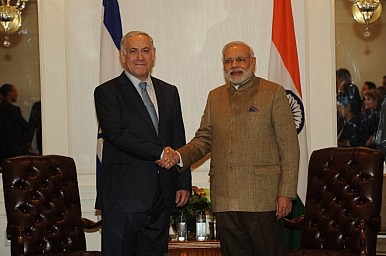What would happen if PM Modi visits Israel?
PM Netanyahu and PM Modi

NEW DELHI: Last September, Israeli PM sent his most trusted aide Yossi Katribas to Delhi to enquire about the reason for the delay of PM Modi’s visit to Israel. Even after five months, there has been little progress in the Prime Minister’s Office on fixing the dates. This caused some consternation in Netanyahu’s office and reportedly led to Katribas’ mission.
The future of Indo-Israel ties is “limitless”, Israeli Prime Minister Benjamin Netanyahu had said during President Pranab Mukherjee’s 3-day state visit to the Jewish state. Seeking partnership in new initiatives, Netanyahu said that the "future belongs to those who innovate".
“I talk to my friend Modi often. When we met the last time, he told me that ‘India needs Israel’,” the Israeli Premier had told Knesset after President Mukherjee addressed a special plenary session. He told the house that PM Modi is seeking a revolution in areas such as dairy, agriculture, solar energy and water - which also corresponds to the four colours in the national flags of the two countries -- white, green, saffron and blue.
So, what happens when Prime Minister Modi does visit Israel?
One, the silence of the previous Congress regime over the Gaza war that killed thousands of Palestinians, was not limited to the party in power. The visit would suggest that the BJP government, officially and more predominantly supports Israel in its West Asian Policy.
Two, if such a visit does take place, PM Modi would be the first PM from India to officially visit Israel. It must be noted that after the visit of Israeli PM Ariel Sharon in 2003, no Indian PM has ever officially visited the country. Thus, it could have concrete repercussions from the Pro-Palestine population in the country and especially the academic and cultural circles that endorse the BDS Movement.
Three, it would also mean friction in India’s stand on Palestine, along with an adverse impact on the increasingly insecure Muslim population in India. At the same time, it would impact India’s relations with Iran, which were somehow improving after the arms embargo and sanctions had been lifted.
Four and most importantly, it could also lead to further strengthening of ISIS and Al- Qaedat al Jihad in India, which is in its nascent phase,( in case we do not follow the controversial theory that ISIS is a creation of Israel and Mossad.)
Nevertheless, PM Modi has already bought Indo-Israel relations ‘out of the closet’ by meeting with Netanyahu in September 2014 on the sidelines of the United Nations General Assembly in New York - the first such meeting between an Indian and an Israeli PM in 11 years. During Modi's last visit to the US, one of his key engagements (apart from a meeting Netanyahu) was an interaction with the representatives of the powerful Jewish lobby. Modi reportedly urged the representatives to help push for bettering India-US and India-Israel ties.
Modi’s relationship with Israel can be traced back to his days as the chief minister of Gujarat. Most of India-Israel trade is driven either by defence spending or precious stones - Gujarat being the hub for the latter. The outright strengthening of political ties between India and Israel, as of 2015, is also due to the lack of reward or recognition by the Arab world to India’s stand in West Asian politics, vis-à-vis the Palestinian issue. On the contrary, under the Organisation of Islamic Conference (OIC), the Arab nations have shown more empathy towards Pakistan than India. Hence, now India, under the current BJP regime is all set to stop any anti-Israel resolutions at the UN.
But as the new day in India-Israel military relations begins, PM Modi needs to understand two crucial factors. First,India is heavily dependent on oil from the Islamic Gulf countries. Forging open friendship with Tel Aviv might anger Riyadh and have its own dramatic consequences. Second, India’s GNP is heavily dependent on the remittances earned by Indians in West Asian countries. In the past, the capture of Indian nurses and other nationals in Iraq by ISIS revealed how incapable India was in defending its own natives from threat and abuse. PM Modi has been smart by first visiting UAE and signing several deals with the federation as Indo-UAE relations amount to $75 billion. Thus, before visiting Israel, PM Modi needs to be sure of differentiating between the friends and foes, based on foreign policy and bilateral trade agreements
In a nutshell, the current NDA regime needs to tread cautiously if it wants to preserve its strategic, economic and energy interests in the West Asian Region. At the same time, along with the military partnerships and deals, PM Modi can also play the ‘soft power’ dynamics and mediator’s role by urging Netanyahu to actively resume the peace-process, thereby charting out a new dynamics for India in the West Asian region.
As of now, no Indian prime minister has ever openly endorsed a powerful Jewish lobby; New Delhi has long been sensitive to the Palestinian cause as well as Muslim West Asia. But PM Modi is not really known for his subtleties, be it his politics or policy.
(The writer is a PhD scholar in Jawaharlal Nehru University, New Delhi)



